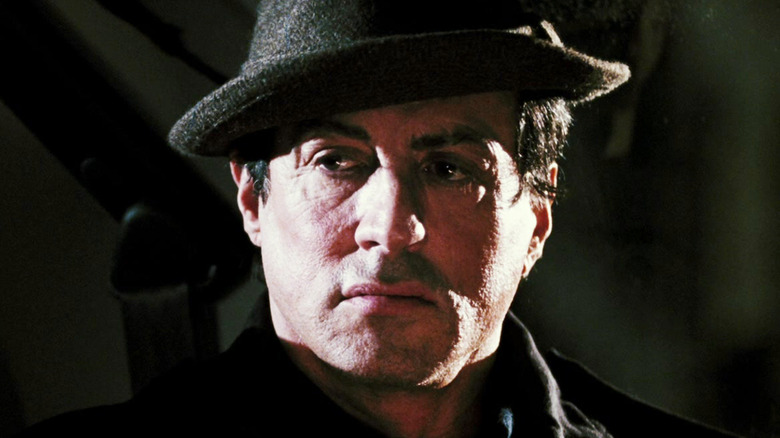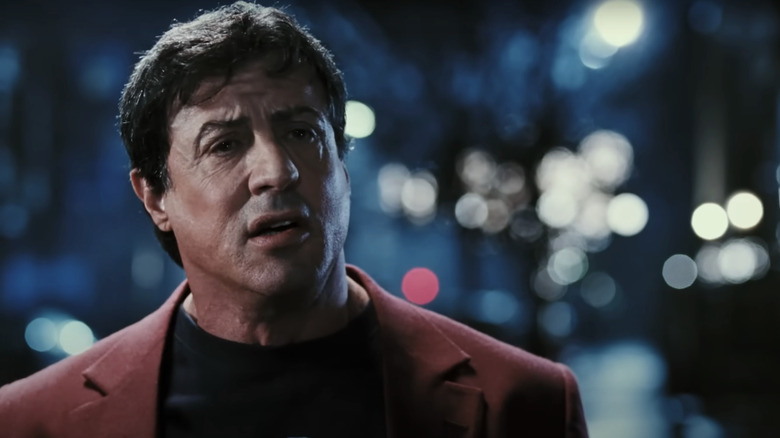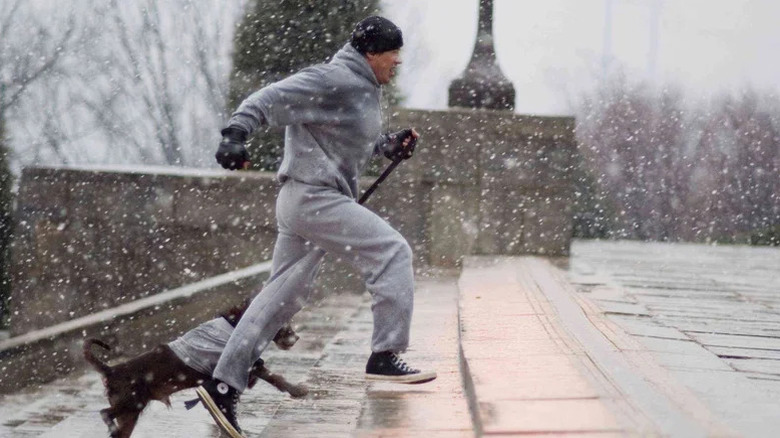
In a 2010 GQ interview, Sylvester Stallone recalled how, in the early 2000s, he found himself trapped in a “generational vortex.” After a string of duds, the actor was on the verge of becoming the very definition of washed up, with a new generation of moviegoers proving to be uninterested in the veteran star. Having conquered Hollywood in the ’70s, Stallone went on to become one of the industry’s biggest A-listers. But around the time his longtime rival Arnold Schwarzenegger tricked Stallone into starring in the 1992 flop that was “Stop! Or My Mom will Shoot,” his career had started to wane. Once he headlined 1995’s “Judge Dredd” (the most ridiculous sci-fi movie to predict our terrifying present), things weren’t looking much better, and by the time the turn of the century arrived, Stallone was in need of a career revival.
Today, we’re used to Hollywood revisiting old IP and churning out unnecessary legacy sequels or reboots. It’s par for the course in an age where Marvel movies are no longer reliably bringing people to the multiplex and streaming has saturated the market. Nostalgia is big business and Hollywood routinely leverages it to keep the receipts coming in. But in 2006, Stallone proved that a legacy sequel doesn’t need to be some cynical cash grab. In fact, he proved that, while such a thing can be a somewhat selfish attempt to regain relevance, it can simultaneously be a powerful and emotionally layered mediation on life and the inexorable march of time.
The same year James Bond got a fresh reboot with “Casino Royale” and a year after Batman had been reinvented by Christopher Nolan’s “Batman Begins” another pop culture hero was newly reinvigorated for the big screen: Rocky Balboa. Stallone was going to pull himself out of that generational vortex with the help of the character that made him a star in the first place. Though it wasn’t quite the so-called “gritty reboot” that Bond and the Dark Knight had been given, 2006’s “Rocky Balboa” was certainly gritty — much like the 1976 movie that kicked off the franchise in the first place. The legacy sequel managed to sidestep the usual pitfalls of similar nostalgia plays, depicting a downtrodden Rocky ruminating on his past in the wake of his wife, Adrian’s, passing. While the movie was undeniably characterized by this mournful atmosphere, it also captured the spirit of the original “Rocky” by showing the titular pugilist returning to the ring and living up to his famous adage of moving forward no matter how hard you get hit. It was a surprisingly moving and powerful entry in a franchise that had, by all accounts, lost its way with 1990’s “Rocky V,” and it just so happens to be Stallone’s favorite of the bunch.
Rocky Balboa was a miracle of a legacy sequel
“Rocky V” seemed to end Sylvester Stallone’s defining saga on a low note — something of which the man himself was acutely aware. Speaking to Bobbie Wygant for the 2006 release of “Rocky Balboa,” Stallone admitted that making the movie became “an all-consuming dream” after the tepid reception for “Rocky V.” Unfortunately for the aging star, getting his sixth Rocky movie made proved even more difficult than it did for the very first movie in the property — and that 1976 effort was green-lit when Stallone was a complete unknown.
As the actor went on to tell Wygant, it took a full seven years to get the legacy sequel made, and it wasn’t just studios that were reluctant to back him. “My wife’s crying every day,” he recalled, “‘Don’t do this. Please, don’t do this,’ you know, ‘You’re gonna be embarrassed.’ I said. ‘It’s okay, it’s okay, I’ll feel a lot worse if I don’t try.'” Much like when a broke Stallone wrote the script for “Rocky” in three days, a Stallone who was in his mid-50s at the time pushed ahead with what seemed like an impossibility in the face of overwhelming resistance. The result was “Rocky Balboa,” which was worth all the effort.
$156 million on a $24 million budget is a success by any measurement, but the critical response was the most impressive result of Stallone’s efforts. Though some reviewers were dismayed at what they saw as needlessly mawkish reflections on Rocky’s past, for the most part critics hailed the return of Rocky Balboa, praising Stallone for restoring dignity to a character who had previously seemed doomed to live in infamy following “Rocky V.” As Stallone’s boxer tells Burt Young’s Paulie in the film, “There’s still some stuff in the basement,” and that proved to be an accurate reflection of Stallone himself. He had something to say beyond the, “Hey, remember this thing that you used to like?” ethos at the heart of most legacy sequels — and it seemed people were ready to listen. What’s more, considering Stallone almost killed off Rocky in “Rocky III” and planned a similarly tragic ending for “Rocky V,” “Rocky Balboa” seemed like even more of a miracle.
With all that in mind, it’s really not that surprising that Stallone considers “Rocky Balboa” one of his highest achievements (if not his crowning one) among “Rocky” movies.
Sylvester Stallone’s favorite Rocky movies are perhaps the best of his career
In a 2020 Instagram video Q&A, Sylvester Stallone was asked about his “best movie.” Without hesitation, the actor replied, “My best movie probably of course is ‘Rocky.'” But he quickly added, “The one I’m most proud of is ‘Rocky Balboa’ because no one wanted to make it. I sat around for six years trying to make that film and when it came out I was so proud of it because of what we had to go through to get it done.”
It seems his feelings haven’t changed since then, either. The actor expressed a similar sentiment to FarOut Magazine in 2025, saying:
“The first one is my favorite but emotionally the last one, ‘Rocky Balboa.’ That was the hardest one to get done. No one believed in it, it was such a long shot. The fact that it worked out is incredible so I’m incredibly proud of that.”
Indeed, “Rocky Balboa” is the second best movie after the original to bear the “Rocky” name on /Film’s ranking of the “Rocky” films. But the reason for that is not just that both films just happened to be difficult to get made. As Stallone himself went on to tell Bobbie Wygant back in 2006, “The first one and [‘Rocky Balboa’]. These were real semi-biographical movies and there’s no getting around that’s why I think they’re the best in the series.” Stallone is clearly aware that “Rocky” and its 2006 legacy sequel most closely mirror his own life struggles, and it’s this quality that makes them the most heartfelt and, therefore, the most resonant entries in the franchise. While he might well be extremely proud of getting “Balboa” made considering the obstacles he had to overcome, it’s clearly about more than that for him. “Rocky” and “Rocky Balboa” feel like his most personal movies, and not just out of the “Rocky” saga itself, but perhaps of his entire film career.




Leave a Reply